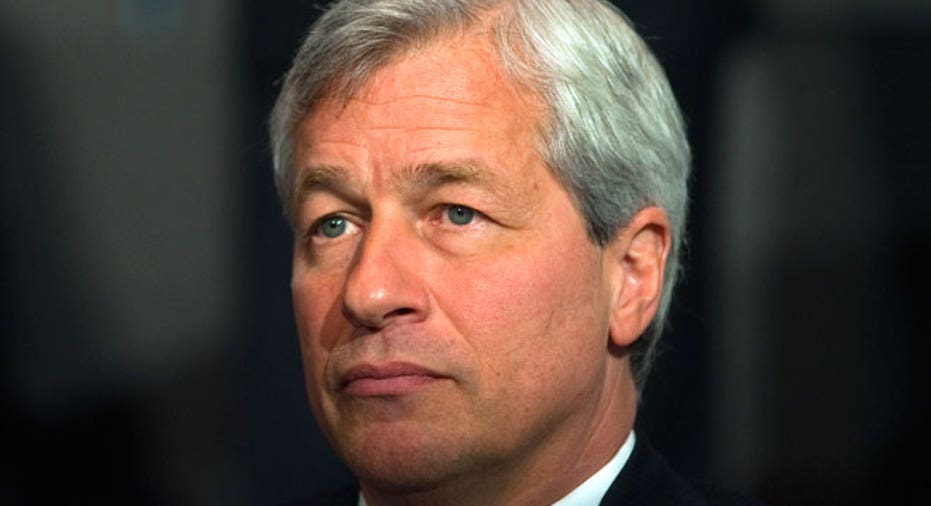Dimon's Foes Leveraging JPMorgan's Troubles

Schadenfreude is described in the dictionary as enjoyment obtained from the trouble of others. Lots of people on Wall Street probably can't spell it, but it doesn't mean many of them aren't feeling at least a tinge of it when it comes to Jamie Dimon.
Dimon, chief executive of JPMorgan Chase (NYSE:JPM) and the closest thing to a rock star on Wall Street, has spent the past three days explaining how his bank lost more than $2 billion on bad bets on corporate bonds.
The losses have sharpened calls for tighter regulations to rein in speculation by “too big to fail banks,” sparked talk of an array of regulatory investigations and Congressional hearings and cost at least one top JPMorgan executive her job.
Lastly, the losses forced the normally supremely confident Dimon to spend all weekend publicly eating crow. And that almost seems to be the point. There seems to be a lot of people out there -- in the media, in politics, at rival banks -- who want to see Jamie Dimon taken down a notch.
One long-time Wall Street trader surveyed the damage with three-days of hindsight and, while acknowledging that $2 billion is “a big number,” conceded that the fallout from the losses and the attendant problems Dimon will face moving forward probably have more to do with the high-profile’s CEO’s perceived “hubris” than with his lack of management skills.
By Monday, reporters from The Wall Street Journal, Bloomberg and various other financial media outlets had dissected and explained the series of trades that led to JPMorgan’s emergency conference call on Thursday to alert investors and shareholders of the losses. In a nutshell, a hotshot trader made huge bets that U.S. corporations were getting healthier as the U.S. economy strengthened. When the recovery faltered, so did those bets.
But none of those detailed accounts suggested that there was anything illegal or even improper about the transactions. They just turned out very badly for JPMorgan.
Nevertheless, regulators at the Securities and Exchange Commission and the Commodities Futures Trading Commission are apparently preparing investigations into the transactions, and Congressional investigators are lining up hearings.
Investigators Could Target Timing of Disclosure
Former Securities and Exchange Commission Chairman Harvey Pitt, in an interview on the FOX Business Network, said he didn’t see anything nefarious in the trades, but that regulators could conceivably target other issues related to the losses. Specifically, investigators could target the timing of JPMorgan’s disclosure of the losses to investors and shareholders: were investors and shareholders informed “at the earliest possible moment,” Pitt asked hypothetically.
Pitt said in his view the losses posed no threat to JPMorgan’s solvency, a sentiment echoed by many on Wall Street.
Indeed, JPMorgan, the largest U.S. bank, had over $2.3 trillion in assets at the end of 2011. The London-based trading unit where the losses occurred had over $350 billion in assets to invest. And the bank recently passed a Federal Reserve-administered stress test to determine whether “too big to fail” banks like JPMorgan have enough reserve capital on hand to withstand another financial calamity similar to the subprime mortgage meltdown in 2008.
Still, none of those facts has prevented Dimon’s foes from using the losses to further their call for stronger regulations on Wall Street.
Perhaps Dimon shouldn’t be surprised. He has been the handsome and articulate face of the much-maligned banking industry in the wake of a financial crisis from which many Americans have yet to recover. A lot of people believe Wall Street’s deep pockets and political connections laid the groundwork for the massive government bailout that kept several of the big banks afloat.
Dimon has been unrepentant in his support of his brethren and his trade. Leveraging his position at the helm of JPMorgan, one of a just a handful of big banks to have more or less successfully weathered the crisis, Dimon has been outspoken in his opposition to tighter regulations to rein in risk, in particular the so-called Volcker rule that would ban banks from investing for their own profit.
Dimon acknowledged immediately that the timing and the scope of JPMorgan’s $2 billion debacle has offered grist to his opponents’ cause. But the reality is that JPMorgan’s losses have neither weakened his argument nor strengthened theirs. It seems that the trades that soured so spectacularly for JPMorgan would very likely have been allowed under the Volcker rule as it is currently interpreted.
JPMorgan’s stock has fallen more than 10% since Dimon announced the losses on Thursday, a considerable hit to one of the sector’s most solid performers. But most analysts believe the hit is temporary, notwithstanding the public spectacle sure to unfold as Dimon is called to Washington to testify and explain himself.
Peter Tchir, a founder of TF Markets in Connecticut, said the long-term view for Dimon and JPMorgan is positive. “My conclusion is that betting the situation is going to get much worse is a bad idea, and that ignoring the doom and gloom crowd is the right trade here. (Dimon) is good, and has had a long history of being very good,” he said.



















